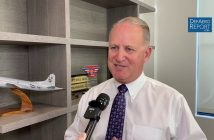Sash Tusa, analyst with the independent equity research firm Agency Partners, discusses Italy’s decision to join Britain and Sweden on the UK-led Team Tempest effort to develop a future combat air capability — team includes BAE Systems, Leonardo, Rolls-Royce and MBDA — the prospect that the UK-Italy-Swedish program will united with SCAF team composed of France, Germany and Spain, developing aircraft that are free of the US International Traffic in Arms Regulations and the outlook for sales to Saudi Arabia if European nations impose restrictions on future exports with Defense & Aerospace Report Editor Vago Muradian at the DSEI conference and trade show in London. Our coverage is sponsored by L3Harris and Leonardo DRS and in partnership with Clarion Events — DSEI’s organizer — and working with the UK Department of International Trade’s Defence & Security Organisation to bring our audience the best in British defense.
Vago Muradian: Welcome to the Defense and Aerospace Report. I’m Vago Muradian covering this 20thAnniversary edition of DSEI, one of the world’s truly great defense and security shows here at the Excel Center in London at this great waterfront venue. Our coverage here is sponsored by L3Harris and Leonardo DRS, and we’re working in partnership with Clarion Events, the organizer of this great exhibition and many more around the world, and we’re working with the UK Department of International Trade, Defence and Security Organization to bring you the very best of British defense.
We’re over here on the Team Tempest and RAF enclosure at DSEI to talk to my good friend Sash Tusa, another one of the best in British defense analysts with Agency Partners, an independent equity research firm in the city.
Wow. Very, very cool model. I know that it’s been out on the circuit a little bit. Sash, you were at the big announcement earlier today that Italian industry is joining. Quelle surprise, as they would say. We’ve talked about this often. Sash is a regular contributor on our weekly podcasts along with Dr. Rocket Ron Epstein and Richard Aboulafia of the Teal Group and many others.
Talk to us a little bit about what you thought were some of the key take-aways from today’s announcement.
Sash Tusa: Look, I think actually getting Italy signed up, and signed up on terms that were agreeable to all three countries. You’ve got to remember, Tempest is now a three-nation program. The Swedes are involved as well. Alessandro Profumo, the Leonardo CEO was really good in making it clear that all three countries, all three industries have to be involved. That this wasn’t just a bilateral, even though clearly and at the signing today was involved.
So what you now have is in Europe two rival programs, each with three partners. You’ve got Tempest — UK, Sweden, Italy; you’ve got SCAF, [FCAF] — France, Germany, Spain. There’s now an incredible competition for the last underlying nations in Europe to see if either of these two programs can actually get them involved.
I think what’s going to be fascinating going forward is going to see who manages to make an appeal to Poland to get the Poles in on acceptable terms, and possibly also, although they are much less important in terms of national aerospace capabilities, but Austria, Switzerland, Greece, are clearly all potentials. But I think Poland is the big prize now. And bringing Italy in here I think was very important in terms of the sheer momentum of the whole Tempest project.
Mr. Muradian: And if you look at it, right, Leonardo was, is part of the Tempest effort from the very beginning. You knew there was going to be some role for Italy, and it was a little bit surprising the Swedes came on a little bit before the Italians did in a certain respect, wasn’t it?
Mr. Tusa: We talked about this before, Vago, and I don’t agree with that interpretation.
The Leonardo business that was involved in Team Tempest when it was a UK program was Leonardo UK, Selex UK, the Edinburgh based sensor business. That was done on a UK basis with UK funding.
I don’t think there was ever the inevitability of Italy coming on board, and the Italian industry coming on board, although clearly what this did was to give the Italians an idea of quite how interesting a program Tempest might be.
Mr. Muradian: But speaking to former and current senior Italian friends of mine, it was very obvious that they were not going to join the Franco-German program. That’s the reason why I was always thinking that they’re going to end up with the British program in many respects. In part because of bristling and the sense that France would be in the driver’s seat on that program and that they would get somewhat less shrift at the end of the day.
It is something we’ve discussed on the podcasts, but this is for our video viewers.
Ultimately, do these two programs end up coming together? Is this town, Europe, big enough for two gunfighters like this to be in it? Or ultimately do they both have to unite?
Mr. Tusa: Europe has three fighter aircraft programs at the moment. Frankly, if Europe came down to two, that would be an improvement.
I don’t agree with that inevitability thesis either. I think the hardest thing is going to be to bring the French and the British together, and the reason for that is not historical animosity. It’s actually, Franco-British programs have been relatively successful in the past. But who will lead? And I don’t think that Dassault is going to find it at all easy to give up the leadership of SCAF or co-leadership of a Franco-British-German Spanish-Swedish-Italian program.
If you listened, watched Dassault’s chief executive, Mr. Trappier, last week, Dassault was already finding it very frustrating, working in a Franco-German program and where the program goes at the speed of the slowest company and the slowest government. That’s causing Dassault huge frustrations already. I think that’s one of the reasons, frankly, why the SCAF [FCAF] program is probably four years behind this program in terms of time scale.
Mr. Muradian: Well, in fairness, the British government, I mean this was a classified program for a few years before it came out into the light two years ago at Farnborough, a year and a half ago at Farnborough. And one of the other points worth making, I mean Eric Trappier who we talked to, the incredibly talented chief executive of Dassault Aviation, —
Mr. Tusa: Oh, very impressive.
Mr. Muradian: — really one of the most impressive figures in the industry, especially given the size of the company and how it [basks]at a weight that is first tier. One of the things he said is look, we are committed to making this work. We understand that we can’t push anybody around, and success is going to be all of us getting across the finish line together. So it was a little bit of a different thing. But at the end of the day he also makes clear, somebody has to lead and we do have that breadth of scale.
Let me take you to an export control issue, though. Somewhat more broadly.
I was at the press conference at RIAT when the Swedish contribution was put forward, and everybody was saying oh, there’s a role for American industry in this program.
On the other hand, this is very much a European, both of these are very much European programs to preserve European aerospace capability, and concerns about Washington having any approval authority given especially in this administration, there is concern that the administration will throw its weight around as American governments throughout history have, to affect the outcomes of very important export competition.
It’s safe to say that Finland could have been using Gripens if it wasn’t for the United States saying you’re not going to get the AMRAAM unless you buy the F-18. It worked out okay for Finland at the end of the day, and I think Finland wanted a link to Washington.
Do you think that this next jet or these next jets are going to have less contribution, less American contribution in them specifically?
Mr. Tusa: Absolutely. These aircraft, both aircraft, both programs are designed to be [ITAF] free and to be U.S. content free.
The overwhelming drive, I mean the phrase that’s used, whatever language people are talking about is national sovereignty. National sovereignty, I’m afraid, means you cannot have another major nation, particularly a competing major nation affecting your ability to use the aircraft, your ability to sell the aircraft.
If you look behind us here at the representative weapons for Tempest, they are all from MBDA. Now you’d expect that. MBDA is a founder, core member of Team Tempest. But they are all European weapons. There isn’t an AMRAAM here, for example, despite the fact that AMRAAM is a key weapon for the [EurFI Platoon] at the moment. But that’s just not going to be part of how either of these programs are managed going forward.
Mr. Muradian: Let me ask you one last question which is very, very strong export numbers from the UK. Nineteen billion pounds of defense and security sales. Utterly stunning, although, and we talked to Mark Goldsack the DSO boss. But one of the pieces of that, obviously, was it was really representative because of the Canadian and the Australian frigate. So that’s a gigantic program in the midst of that.
But let’s talk a little bit more in granular detail about the fact that because Saudi Arabia is one of the most important nations from an export perspective to the United Kingdom, and indeed to European government, and there are significant concerns over Saudi use of Western arms in Yemen, that there is going to be a backlash and that there is going to be an impact at the end of the day. And Britain, the ability to sell Eurofighter depends on all of the Eurofighter countries, for example, agreeing to do that.
If there’s a change of government in Germany or even parliamentary moves in Germany, you could see that export license being cut off.
What are the implications of this? How does this play out? And how does everybody not get hit? And I have one budget follow-up question to ask you as well.
Mr. Tusa: I think that’s one of the reasons why, even in Typhoon there’s been an effort to reduce the degree to which Germany can veto major exports. In particular supplying if not complete aircraft, but clearly spare parts and so forth, out of the stocks of other nations to keep the whole program going.
I think the German government has only been more expressive about this than many other governments feel. I think it would be wrong to think that Sweden is a died in the wool exporter to the Middle East. Sweden has, and there’s clearly very, very strong political concerns about that —
Mr. Muradian: And got burned about the Saudi weapons contract, right? I mean it caused Sten Tolgfors to resign effectively.
Mr. Tusa: And clearly also, exports into India, but for different reasons.
So issues with export licenses are only going to get tougher over the next 10, 15, 20-odd years. But I think that’s going to affect everybody. I don’t think the idea that the UK can just sit there, or will be prepared politically to certain export irrespective of what their partners say, I think even that will have changed through the next decade.
Mr. Muradian: Given that our schedules are changing and I may not be able to ask you this question tomorrow after Boris Johnson, the British Prime Minister at least has a bit of good news in announcing a major weapon contract, at this point we expect that Babcock is the one who’s going to win the close-fought competition for the Type 31 frigate. BAE was in that competition. The whole question has been where it’s going to be produced. Our understanding is the Prime Minister is going to announce that the ships are going to be built in Scotland.
But how does this fit with the British shipbuilding strategy? How do some of these decisions, in your view, and you can take this to the oiler as well, where there’s concerns about where it would be built or whether it would be acquired from overseas. It looks like the Japanese are out of that competition. But it looks that Navantia is still in it. But then there are questions by some in London of why would we order oilers from Spain when tensions are rising in Gibraltar?
Walk us through some of these decisions and how to think about them. Or more importantly, how the government should be thinking about them at a time when it’s trying to support global Britain, British industry?
Mr. Tusa: There’s actually two very separate issues with regard to shipbuilding strategy.
The current national shipbuilding strategy, which was put together by Sir John Parker, says that the UK should be trying to build warships — either warships or parts of warships — in more yards. Rather than having this super concentration in Scotland and specifically up on the Clyde in Glasgow, that there should be a much more even distribution of production.
I think that’s economically untenable. I think that might have worked okay in the ‘50s and ‘60s. When we have a nation that has roughly 20 escorts and then 10 other large warships and warship-like things, the idea you can spread that around I think is actually unthoughtful, personally.
But then there is a separate issue of shipbuilding strategy, lower case, which is what is the risk, if what is currently the UK but might become England, builds its warships in what is currently part of the UK but might become Scotland? And having Babcock produce Type 31 frigates at Rosyth in Eastern Scotland; BAE producing the Type 26 frigates on the Clyde in Western Scotland; that does not address the issue of Scottish independence at all. In fact, it arguably increases the UK’s sort of dependence on Scotland. That may be a political point that Prime Minister Boris Johnson is trying to make. I wouldn’t be so sure of that.
Mr. Muradian: Do you, we talked to Anne-Marie Trevelyan yesterday, the Minister for Defence Procurement. She talked about the importance of skills. She dodged, I asked her whether Type 31, and there was a concern that Babcock which is the nation’s most important nuclear yard and so critical to Astute as well as to the Vanguard class but also to the Dreadnought class — ten points on names, once again. British ship names, all tops. And she talked about in the broad, maintenance and growth of national skills is a critical thing.
Do you think that’s going to play at all as a factor in this? Or as how Babcock will tell you, we have a shipbuilding side of the business, we have a nuclear side of the business. We can walk and chew gum at the same time.
Mr. Tusa: I’m unconvinced by that latter argument. I think that ultimately there’s a relatively small, finite number of naval engineers and you’re always going to want to put them where the need is greatest. And if that means robbing one side, in this case nuclear, to feed the frigate side, I think there is the risk of that happening. But I don’t think there are enough naval engineers in the UK period. So skills is a very, very important issue.
And this is made worse by the fact that the UK shipbuilding strategy says we’ll produce complex warships in the UK, but we won’t produce what are rather, it’s a rather derogatory term, called auxiliaries in the UK. And we come back to the issue of the [inaudible]support ships. These are huge ships. They’re designed to support the aircraft carriers, and laughably, they are referred to as being auxiliaries and hence they can be built by anybody, whether that’s Navantia in Spain or the Koreans or previously the Japanese.
If you look at how the Royal Navy uses, mans, operates its auxiliaries, these are auxiliary warships. They are not civilian ships painted a darker shade of gray. They have naval commanders. They have weapons. They carry Marines. They have sophisticated military communications and in some cases EW. That’s a warship.
The idea that you would try to get the cheapest price by putting that out abroad, no other nation, let alone sane nation in the world, would do that. Just so you understand that.
Mr. Muradian: Sash Tusa, my good friend, analyst at the independent equity research firm Agency Partners in sunny London.
And check out our podcast every week. It comes out on Sunday nights, available for you on Monday mornings. That includes Dr. Rocket Ron Epstein of Bank of America, Merrill Lynch; as well as Richard Aboulafia of the Teal Group Consultancy. All good friends and tremendous analysts.
Sash, have a great show. Hopefully, we can talk to you one more time before we wrap it up. Thanks very much for joining us.
Mr. Tusa: Thank you.
30



